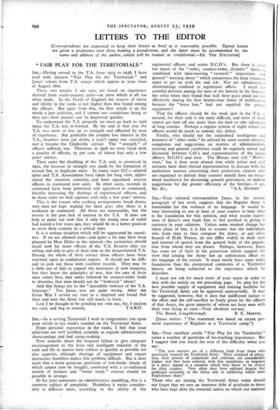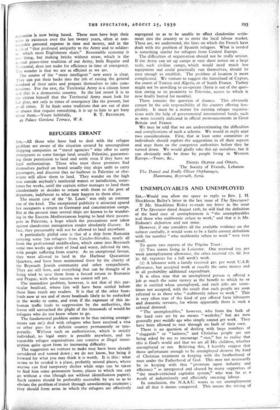LETTERS TO THE EDITOR
[Correspondents are requested to keep their letters as brief as is reasonably possible. Signed letters are given a preference over those bearing a pseudonym, and the latter must be accompanied by the name and address of the author, which will be treated as confidential.—Ed. THE SPECTATOR] " FAIR PLAY FOR THE TERRITORIALS " SLR,—Having served in the T.A. from 1914 to 1938, I have read with interest " Fair Play for the Territorials " and Janus' echoes from T.A. camps which appear in your issue of August 18th.
These two articles I am sure, are based on experience derived from south-country units—an error which is all too often made. In the North of England the reserve of talent and ability in the ranks is not higher than that found among the officers. But apart from this, the first article is on the whole a just criticism, and I cannot see—conditions being as they are—how matters can be improved quickly.
To understand the T.A. properly we must go back to 1920 when the T.A. was re-formed. By the end of that year the T.A. was more or less up to strength and officered by men of experience. But gradually the country lost interest in the T.A., bounties were cut down, a year's camp was cancelled, and it became the Cinderella service. The " strength " of officers suffered, too. Therefore in 1938 we were faced with a paucity of officers, 75 per cent. of whom had only a few years' service.
Then came the doubling of the T.A. and, as promised in 592o, the increase in strength was made by the formation of second line or duplicate units. In many cases O.C.s original units and T.A. Associations have taken the long view, appre- ciated the situation correctly, and have appointed reserve officers to command new units. In other cases, seconds in command have been promoted and appointed to command, thereby increasing the shortage of experienced officers, and in those units we find captains with only a few years' service.
This is the reason why cooking arrangements break down; why men are kept waiting for their pay; why there is a weakness in command. All these are inexcusable, but the reason is the past lack of interest in the T.A. It does not help to point out now that if only the young men of today had joined a few years ago, they would be in a better position to serve their country in a critical time.
It is a serious situation which will be aggravated by casual- ties. If we are allowed time—and quite a lot may have been planned by Herr Hitler in the interval—the authorities should recall now far more officers of the T.A. Reserve who are willing and able to give of their time to the inexperienced T.A. During the whole of their service these officers have been reported upon in confidential reports. It should not be diffi- cult to pick out those with excellent records. They may be a little out of date as regards the intricacies of new weapons, but they know the principles of war, that the care of their men comes first, that order followed by counter-order leads to disorder, that men should not be " bothered " about !
And this brings me to the " incredible violence of the T.A. language." Yes, Janus, you are quite wrong. After the Great War I served my time in a shipyard and found that then and now the Army has still much to learn.
Lest I be thought to be grinding my own axe, Sir, I enclose Sta,—As a serving Territorial I wish to congratulate you upon your article in last week's number on the Territorial Army.
From personal experience in the ranks, I feel that your criticisms are well justified, certainly as regards administrative shortcomings and bad camp-cooking.
Your remarks about the frequent failure to give adequate encouragement to the keen and intelligent majority of the rank and file to master their subject as quickly as possible are also apposite, although shortage of equipment and expert instructors doubtless makes this problem difficult. But it does seem that a more generous provision of text-books (many of which cannot now be bought), combined with a co-ordinated system of lectures and "home study " courses should be possible to arrange.
As for your comments on administrative muddling, this is a common subject of complaint. Doubtless it varies consider- ably in different units, according to the ability of the
regimental officers and senior N.C.O.'s. But there is often too much of the " order, counter-order, disorder " busine,,, combined with time-wasting " eyewash " inspections and
general " messing about " which exasperates the keen volunteer eager to get on with the real job. Nor are administrative shortcomings confined to regimental affairs. I recall the scornful derision among the men of my battery in the Septem- ber crisis when they found that half their guns could not hie effectively during the first twenty-four hours of mobilisation because the " brass hats " had not supplied the proper equipment!
That the officers should be the weak spot in the T.A. is natural, for their task is the most difficult, and most of them cannot get time off any more than the men to take advantage of long courses. Perhaps a regular system of night school for officers would do much to remedy this defect.
Finally, why should not the undoubted intelligence and keenness of " other ranks " be utilised by some system whereby complaints and suggestions on matters of administration, training and general conditions could be regularly raised and discussed between C.O.'s and representatives of the junior officers, N.C.O.'s and men. The Blimps may yell " Bolshe- vism," but it does seem absurd that while police and civil servants have their elected representatives to discuss with the authorities matters concerning their profession, citizens who are organised to defend their country should have no recog- nised machinery for discussing general grievances, or making suggestions for the greater efficiency of the Service.—I am,
SIR,—Your talented correspondent Janus, in his second paragraph of last week, suggests that the Regular Army is remarkable for the violence of its language. It would be very interesting to one at least of your readers to hear what is the foundation for this opinion, and what recent experi- ence of Janus's own leads him to feel justified in giving it currency in your columns. Unless some marked change has taken place of late, it is fair to assume that the individuals who from time to time compose the Army, or any other branch of H.M. Forces, do not differ widely in their style and manner of speech from the general body of the popula- tion from whom they are drawn. Perhaps, however, Janus has some set of facts in his possession which support his view that joining the Army has an unfortunate effect on the language of the recruit. It must surely have some wider foundation than the exasperated comments of a Territorial battery on being subjected to the experience which he describes.
I must not ask for much more of your space in order to deal with the article on the preceding page. Its plea for the best possible supply of equipment and training facilities for the Territorial Army can be approved unreservedly. It may be suggested, however, that it does but indifferent justice to the effort and the self-sacrifice so freely given by the officers of that Army, the great majority of whom are busy men with their own living to earn.—Your obedient servant,
[Janus writes: " The statement was based on recent per- sonal experience of Regulars at a Territorial camp."] SIR,—Your excellent article "Fair Play for the Territorials " raises a number of questions of far-reaching importance. But I suggest that you touch the root of the difficulty when you say: "The new recruits are of a different kind from those who previously entered the Territorial Army. Their standard of educa- tion, their powers of judgement and criticism, are considerably higher, and they have enlisted, with few exceptions, in response to a grave appeal at a moment which they know to be critical for their country. Very often they have enlisted despite that profound antipathy to the Army and to soldiering which most Englishmen share."
Those who are joining the Territorial Army today should not forget that we owe an immense debt of gratitude to those who have kept alive the essential cadres on which our national expansion is now being based. These men have kept their its in existence over the last twenty years, often at con- siderable personal expense in time and money, and in the te_th of "that profound antipathy to the Army and to soldier-
in most Englishmen share." Reasonable economy is one thing, but making bricks without straw, which is the normal peace-time tradition of our Army, both Regular and Territorial, does not make for efficiency in time of emergency. The wonder is that we are as efficient as we arc.
The course of the "more intelligent " new entry is clear. They can put their backs into the job of raising the general standard of their units and prepare themselves to take com- missions. For the rest, the Territorial Army is a citizen force and this is a democratic country. In the last resort it is to the citizen himself that the Territorial Army must look for fair play, not only in times of emergency like the present, but at all times. If he finds some traditions that are out of date or abuses that require remedying, it is up to him to get busy
about them.—Yours faithfully, B. T. REYNOLDS. 49 Palace Gardens Terrace, W.8.









































 Previous page
Previous page